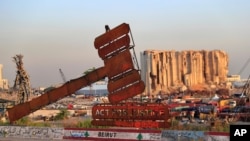The struggle for justice isn’t over for the victims of Beirut’s 2020 port explosion. Protests by families and friends of those who lost loved ones in the blast, recorded as one of the largest non-nuclear explosions in history, continue, as do those by families whose relatives have been arrested while awaiting trial.
Observers decry the lack of accountability by the government to deal with the national disaster, even as two Lebanese lawmakers charged in connection with the catastrophe won re-election to parliament.
Improperly stored ammonium nitrate at the Beirut port exploded on August 4, 2020, killing more than 215 people and wounding some 7,000, while leaving swaths of the Lebanese capital in ruins.
Many Lebanese blame the explosion on security and political officials who failed to enforce safety regulations. But now, nearly two years later, no one has been held accountable.
On Friday, families of those arrested in the explosion case staged a sit-in in front of the Justice Ministry, demanding “an immediate fair trial to allow them to prove their innocence,” according to Lebanon’s National News Agency.
Meanwhile, families and friends of victims continue their protests to demand justice, but many accuse political powerbrokers of actively sabotaging the probe, blocking the judge appointed to investigate from doing his job and calling for an international investigation.
Two Lebanese lawmakers with the Hezbollah-backed Shi'ite Amal Movement, Ali Hassan Khalil and Ghazi Zeaiter, have sought to disrupt Judge Tarek Bitar from carrying out his investigation, which is now suspended. Both are charged in connection with the explosion and yet they were both re-elected recently to parliament.
Lama Fakih directs Human Rights Watch in Beirut. She recently told the Carnegie Middle East Center there that the case cannot resume until new judicial appointments are made under a new prime minister and cabinet.
“There is concern that this is, of course, going to take quite a long time because historically formations of government have taken more than a year," Fakih said. "There are very real obstacles to achieving justice for victims of the blast domestically. And this is why we and others, including victims’ families, have been calling for an international fact-finding mission to conduct an inquiry into the events.”
Kim Ghattas, a nonresident senior fellow at the Carnegie Endowment for International Peace, says she hopes Lebanon’s new parliament will tackle the serious crises engulfing Lebanon, including responsibility for the port explosion.
“Accountability is crucial to everything, whether accountability for what happened at the port, who was responsible at the various levels, whether it comes to accountability for who brought the country to its knees economically, that is really something that should be at the heart of the work of the members of parliament," Ghattas said.
Observers blame Lebanese officials for constantly recusing judges investigating the explosion and stopping procedures when summoned for questioning, thus impeding the course of justice.




